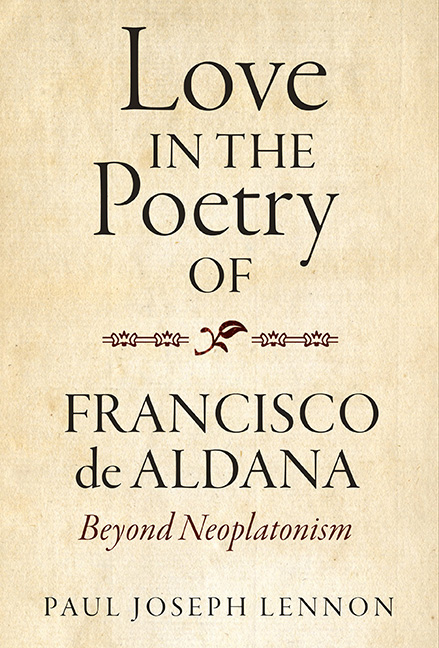1 - The Complexities of Love
Published online by Cambridge University Press: 15 October 2019
Summary
The successful orientation and exploration of Francisco de Aldana's lyric requires the introduction of two fundamental concepts that underpin not only the present study, but also the love poetry of the Early Modern period. First, Neoplatonism, born of Ficino's take on the philosophical system that was subsequently imported from Italy to Spain, and Petrarchism, a school of love poetry built upon the selective reception of Francesco Petrarca's Canzoniere in light of the Questione della lingua. My intention in this initial chapter is to chart the development of these concepts via key texts on the philosophy of love in the Renaissance. For example, the changing nature of Neoplatonism after Ficino's De amore (1484) is examined in light of Pietro Bembo's Gli Asolani (1505), Baldassare Castiglione's Il Cortegiano (1528), Leone Ebreo's Dialoghi d'amore (1535), Tullia D'Aragona's Dialogo dell'infinità d'amore (1547) and Agostino Nifo's De pulchro et amore (1549). The revival of Petrarchan poetics is treated through the lens of Bembo's Prose della volgar lingua (1525) and the Neoplatonic Academy of Florence, of which Garcilaso de la Vega and Juan Boscán were also part. Subsequent to this survey of the contemporary interrogation and alteration of both concepts, I will move on to examine Aldana's reception of each and consider which predecessors may have informed his approach, as well as to what extent he alters the role of each concept in its synthesis with his poetry.
Ficinian Neoplatonism was a philosophical trend that helped to explain the effects and varieties of love experienced in a Christian context. Its presentation of an ideal love included transcendence to a spiritual plane of true knowledge that was envisaged to be accomplishable via the appreciation and contemplation of the fusion of beauty and love. Neoplatonism was a widespread phenomenon throughout Europe and beyond, with particularly strong evidence for its reception in Spain and its Empire indicated by the Hispanic translations of texts including Castiglione's Il Cortegiano by Boscán (1534), the anonymous rendering of Bembo's Gli Asolani (1551), and Ebreo's Dialoghi d'amore by El Inca Garcilaso de la Vega (1586). These texts ran concurrent with a corpus of Neoplatonic poetry composed in the new lyric models made popular by Garcilaso de la Vega and Juan Boscán, among others, after their time in Italy.
- Type
- Chapter
- Information
- Love in the Poetry of Francisco de AldanaBeyond Neoplatonism, pp. 7 - 48Publisher: Boydell & BrewerPrint publication year: 2019



